- Home
- Carlos Ruiz Zafón
The Watcher in the Shadows Page 3
The Watcher in the Shadows Read online
Page 3
Listening to Hannah was entertaining and exhausting in equal measure. After wolfing down her own breakfast, and Irene’s leftovers, she stopped talking for a few seconds. The silence that filled the room felt unreal. It didn’t last long, of course.
‘Shall we go for a walk so I can show you the village?’ she asked, suddenly excited at the prospect of acting as a tourist guide.
Irene and her mother exchanged glances.
‘I’d love that,’ said Irene after a short pause.
Hannah smiled from ear to ear.
‘Don’t worry, Madame Sauvelle. I’ll bring her back in one piece.’
Irene and her new friend shot out through the front door and set off towards the Englishman’s Beach, while the house slowly recovered its sense of calm. Simone took her cup of coffee out onto the porch to enjoy the peaceful morning. Dorian waved at her from the cliffs.
Simone waved back at him. Curious boy. Always alone. He didn’t seem to be interested in making friends, or perhaps he didn’t know how to. Always lost in his own world and his notebooks, and whatever else filled his mind . . . As she finished her coffee, Simone took one last look at Hannah and her daughter walking off towards the village. Hannah was still chatting away. It takes all sorts, she thought.
Learning about the mysteries and subtleties of life in a small coastal village took up most of the Sauvelles’ time that first month in Blue Bay. The initial phase – a period characterised by culture shock and confusion – lasted a good week. During that time they discovered that, apart from the metric system, all the customs, rules and peculiarities of Blue Bay were completely different to their Paris equivalents. Firstly, there was the question of timekeeping. In Paris it wouldn’t be an exaggeration to say that for every thousand inhabitants there were another thousand watches – tyrannical inventions that organised life with military precision. Yet in Blue Bay there seemed to be no other timepiece than the sun. And no other cars but Doctor Giraud’s, the vehicle belonging to the police and Lazarus’s car. And no other . . . the list seemed endless. Deep down, though, the differences didn’t lie in the number of things, but in the way of life.
Paris was a city of strangers, a place where you could live for years without knowing the name of the person who lived across the landing. In Blue Bay you couldn’t sneeze or scratch the tip of your nose without the event being widely commented on by the whole community. This was a village where even a cold was news and where news was passed on quicker than a cold. There was no local paper, nor was there any need for one.
It was Hannah’s mission to instruct the family on the life, history and wonders of the small community. Because of the dizzying speed with which the girl machine-gunned out her words, she managed to compress into a few sessions enough information to fill an encyclopedia. This was how they found out that Laurent Savant, the local priest, organised diving championships and marathons, and that on top of his stammering sermons about laziness and lack of exercise, he’d covered more miles on his bicycle than Marco Polo. They also learned that the village council met on Tuesdays and Thursdays at one o’clock to discuss local issues. During these meetings, Jean-Luc Dupuy, who had effectively been appointed mayor of Blue Bay for life and was as old as Methuselah, spent a good deal of time stroking the cushions of his armchair under the table, convinced that he was exploring the hefty thighs of Antoinette Fabré, the town hall’s treasurer and a fierce spinster.
Hannah rattled out an average of six stories per minute. This was not unrelated to the fact that her mother, Elisabet, worked in the bakery, which seemed to double up as an information hub, detective bureau and agony-aunt service for the village.
It did not take long for the Sauvelles to realise that the village financial system tended towards a rather strange twist on Parisian capitalism. The bakery, it would appear, sold baguettes, but in the back room an information exchange was also in operation. Monsieur Desplat, the cobbler, mended belts, zips and the soles of shoes. However, his forte was his double life as an astrologer and tarot card reader . . .
This pattern was repeated over and over again. On the surface, life seemed calm and simple, but underneath it had more twists and turns than the road to hell. The best thing to do was to go with the flow, listen to the villagers and allow them to guide you through all the formalities newcomers had to complete before you could say you lived in Blue Bay.
That is why, every time Simone went to the village to collect the post for Lazarus, she dropped by the bakery to get an update on past, present and future news. The ladies of Blue Bay received her warmly and soon began to bombard her with questions about her enigmatic employer. Lazarus led a secluded life and was seldom seen in the village. That, together with the torrent of books he received every week, had turned him into a source of endless curiosity and suspicion.
‘Imagine, Simone, dear friend,’ Pascale Sardé, the chemist’s wife, confided in her one day, ‘a man all alone – well, practically alone – in that house, with all those books . . .’
Simone would usually smile when faced with such words of wisdom, but never breathed a word. As her late husband had once said, it wasn’t worth wasting your time trying to change the world; it was enough not to let the world change you.
She was also learning to respect Lazarus’s complex demands concerning his correspondence. His personal letters had to be opened one day after they arrived and answered promptly. Commercial or official post had to be opened the day it arrived, but should only be replied to one week later. And he was adamant that any mail sent from someone called Daniel Hoffmann in Berlin should be handed to him in person, and never, under any circumstances, be opened by her. The reason behind all this was none of her business, Simone concluded. She liked living in Blue Bay and it seemed a fairly healthy place in which to bring up her children. The matter of which day letters should be opened on was something she felt gloriously indifferent about.
For his part, Dorian discovered that even his semi-professional dedication to map making still allowed him time to make a few friends among the village boys. None of them seemed to care whether or not he was a newcomer; or whether or not he was a good swimmer (he wasn’t, but his new friends made sure he learned how to stay afloat). He also learned that pétanque was a game only those on their way to retirement played and that running after girls was the domain of petulant fifteen-year-olds at the mercy of hormonal fevers that preyed both on their complexion and their common sense. At his age, apparently, all you were supposed to do was ride around on your bicycle, daydream, and watch the world go by, waiting for the moment when the world would start watching you. And on Sunday afternoons, a visit to the cinema. That is how Dorian discovered a new and unspeakable love, next to which map making and the study of moth-eaten parchments paled in comparison: Greta Garbo. A divine creature whose very name was enough to make him lose his appetite, despite the fact that she was basically an old woman, just past thirty.
While Dorian debated whether his fascination for such an old woman meant there was something seriously wrong with him, it was Irene who bore the full brunt of Hannah’s attentions. A list of single, desirable young men was top of Hannah’s agenda. Her fear was that if after two weeks in the village Irene didn’t begin to flirt, even half-heartedly, with at least one of them, the boys would think she was strange. Hannah was the first to admit that in terms of physical appeal the list of candidates passed the test reasonably well, but when it came to brains they were barely functional. Even so, Irene was never short of admirers, which provoked a healthy envy in her friend.
‘If I was as popular as you, I’d be making the most of it!’ Hannah would say.
Glancing at the pack of boys milling around nearby, Irene smiled timidly.
‘I’m not sure I feel like it . . . They seem a bit foolish . . .’
‘Foolish?’ Hannah exploded, annoyed at such a wasted opportunity. ‘If you want clever conversation pick up a book!’
‘I’ll think about that,’ Irene laughed.
/> Hannah shook her head.
‘You’ll end up like my cousin Ismael,’ she warned.
Hannah’s cousin Ismael was sixteen and, as Hannah had explained before, he’d been raised by her family after his parents died. He worked on his uncle’s fishing boat, but his real passion seemed to be sailing alone on his own boat, a skiff he’d built himself and had christened with a name Hannah could never remember.
‘Something Greek, I think . . .’
‘And where is he now?’ asked Irene.
‘Out at sea. He and Dad are aboard the Estelle. The summer months are good for the type of fisherman who likes to head off for adventure on the high seas. They won’t be back until August,’ Hannah explained.
‘It must be sad. Having to spend so much time at sea, far from home.’
Hannah shrugged.
‘You have to make a living somehow . . .’
‘You don’t really like working at Cravenmoore, do you?’ Irene guessed.
Her friend looked at her in surprise.
‘It’s none of my business . . . of course,’ Irene corrected herself.
‘I don’t mind you asking,’ Hannah said with a smile. ‘The truth is, I don’t really like it much, no.’
‘Because of Lazarus?’
‘No. Lazarus is kind and he’s been very good to us. When Dad had an accident years ago, involving propellers, he paid for all the expenses of the operation. If it hadn’t been for Lazarus . . .’
‘So what’s the problem?’
‘I don’t know. It’s that place. The machines . . . It’s full of all those machines and I feel they’re constantly watching me.’
‘They’re only toys.’
‘Try sleeping there one night. The moment you close your eyes, tick-tock, tick-tock . . .’
They looked at one another.
‘Tick-tock, tick-tock . . . ?’
Hannah gave her an ironic smile.
‘Well I might be a coward, but you’re going to be a spinster.’
‘I love spinsters,’ said Irene.
That is how, almost without their noticing, one day and then another went by, and before they knew it August was marching in through the door. With it came the first rain of the summer, passing storms that lasted only a couple of hours. Simone was busy with her work. Irene was getting used to life with Hannah. And as for Dorian, he was learning to dive and drawing imaginary maps of Greta Garbo’s secret geography.
Then, one ordinary day, one of those August days when the night’s rain had sculpted towering castles of cloud above the luminous blue sea, Hannah and Irene decided to go for a walk along the Englishman’s Beach. It was now a month and a half since the Sauvelles had arrived in Blue Bay and it seemed as if nothing more could surprise them. However, the real surprises were only about to begin.
The noon sun revealed a trail of footprints along the white sheet of sand by the water’s edge. In the distant port, masts swayed like a mirage. In the middle of a vast expanse of sand, Irene and Hannah sat on the remains of an old boat surrounded by a flock of small blue birds that seemed to be nesting in the pale dunes.
‘Why do they call this the Englishman’s Beach?’ asked Irene, as she scanned the desolate coast between the village and the headland.
‘For years, an old English painter lived here, in a hut. The poor man had more debts than paintbrushes. He would give paintings to people in the village in exchange for food and clothes. He died three years ago. He is buried here, on this beach,’ Hannah explained.
‘If I was given the choice, I’d like to be buried in a place like this.’
‘What a cheerful thought,’ joked Hannah with just a hint of reproach.
‘Don’t worry, I’m in no hurry,’ Irene added. Just then she noticed a small sailing boat ploughing through the waters of the bay, some hundred metres from the coast.
‘Ufff . . .’ murmured her friend. ‘There he is: the solitary sailor. He hasn’t even been back a day and off he goes on his boat again.’
‘Who?’
‘My father and my cousin arrived back from sea yesterday,’ Hannah explained. ‘My father is still sleeping, but him . . . he’ll never change.’
Irene looked out to sea and watched the boat as it sailed across the bay.
‘That’s my cousin Ismael. He spends half his life on that boat, at least when he’s not working with my father. But he’s a good lad . . . See this pendant?’
Hannah showed her a beautiful pendant hanging round her neck on a gold chain: a sun setting on the sea.
‘It’s a gift from Ismael . . .’
‘It’s gorgeous,’ said Irene, studying the pendant carefully.
Hannah stood up and gave a yell that catapulted the flock of blue birds to the other end of the beach. Moments later, the distant figure at the helm waved and the vessel headed for the beach.
‘Whatever you do, don’t ask him about his boat,’ Hannah warned her. ‘And if he brings it up, don’t ask him how he made it. He’ll spend hours talking about it non-stop.’
‘It must run in the family . . .’
Hannah threw her a furious look.
‘I think I’ll leave you here on the beach, at the mercy of the crabs.’
‘I’m sorry.’
‘Apology accepted. But if you think I talk a lot, wait till you meet my godmother. The rest of the family seem dumb by comparison.’
‘I’ll be delighted to meet her.’
‘Hah,’ replied Hannah, unable to suppress a mocking smile.
Ismael’s boat cut cleanly through the breaking waves and the keel sliced into the sand like a blade. The boy hurriedly eased the halyard and lowered the sail to the base of the mast in just a few seconds. He was obviously not lacking in practice. As he jumped ashore, his gaze was drawn towards Irene, examining her from head to toe with the same confidence he displayed in his sailing skills. Hannah rolled her eyes and stuck out her tongue, then proceeded to introduce them.
‘Ismael, this is my friend Irene,’ she announced. ‘But there’s no need to eat her alive.’
The boy nudged his cousin with his elbow and stretched out a hand to Irene.
‘Hello . . .’
His brief salutation came with a timid, but sincere smile. Irene shook his hand.
‘Don’t worry, he’s not stupid; that’s just his way of saying he’s pleased to meet you,’ Hannah explained.
‘My cousin talks so much that sometimes I think she’s going to use up the entire dictionary,’ Ismael joked. ‘I suppose she’s already warned you not to ask me about my boat . . .’
‘Actually, she hasn’t,’ Irene replied cautiously.
‘Of course not. Hannah thinks that’s the only subject I can talk about.’
‘You’re not bad on fishing nets and rigging either, but when it comes to your boat, cousin, you’re on overdrive!’
Irene was amused by the banter between the two cousins. There didn’t seem to be any malice in it, just a bit of spice.
‘I hear you’ve moved into Seaview,’ said Ismael.
Irene fixed her eyes on the boy and drew her own portrait. Sure enough, he was about sixteen; his skin and hair showed the effects of all the time spent at sea. His strong physique was the result of hard work in the docks, and his arms and hands were marked with small scars – something she didn’t often see on the boys in Paris. One scar, longer and more pronounced than the others, extended down his right leg, from above the knee to the ankle. Irene wondered where he’d picked up such a trophy. Finally, she lingered over his eyes, the only feature that struck her as being out of the ordinary. Large and pale, Ismael’s eyes seemed to mask secrets behind their intense and somewhat melancholy expression. Irene remembered the same look in the eyes of the nameless soldiers with whom she’d shared a brief dance in time to a fourth-rate band – a look that concealed fear, sorrow or bitterness.
‘Have you gone into a trance?’ Hannah interrupted her reverie.
‘I was just thinking it’s getting late. My mothe
r will be worried.’
‘Your mother will be delighted to be left in peace for a few hours. But it’s up to you,’ said Hannah.
‘I can take you home on my boat,’ Ismael offered. ‘Seaview has a small jetty down by the rocks.’
Irene looked at Hannah inquisitively.
‘If you say no you’ll break his heart. My cousin wouldn’t even invite that starlet Carole Lombard onto his boat.’
‘You’re not coming?’ Irene asked, embarrassed.
‘I wouldn’t get into that tub if you paid me. Besides, it’s my day off and tonight there’s a dance in the square. Think about it. Some wise words from a fisherman’s daughter: all the best matches are made on dry land. Anyway, I don’t know what I’m saying. Go on, go with him. And you, sailor boy, my friend had better get home in one piece, do you hear me?’
The boat, which appeared to be called the Kyaneos – judging from the name written on the hull – put out to sea, her white sails billowing in the wind as the prow cut through the water towards the headland.
Between tacks, Ismael smiled timidly at Irene and only sat at the helm once the boat was set on a steady course, running with the current. Holding tight onto the bench, Irene felt droplets of salty water landing on her skin in the breeze. By now the sails had caught the wind and Hannah was no more than a tiny speck waving from the shore. The force of the boat powering across the bay and the sound of the waves splashing against the hull made Irene feel like laughing out loud.
‘First time?’ asked Ismael. ‘On a sailing boat, I mean.’
Irene nodded.
‘It’s different, isn’t it?’
She nodded again, smiling, unable to take her eyes off the large scar on Ismael’s leg.

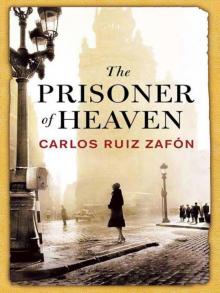 The Prisoner of Heaven
The Prisoner of Heaven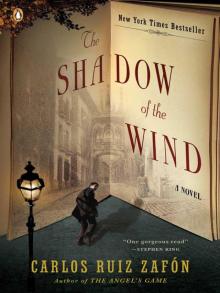 The Shadow of the Wind
The Shadow of the Wind Marina
Marina The Angel's Game
The Angel's Game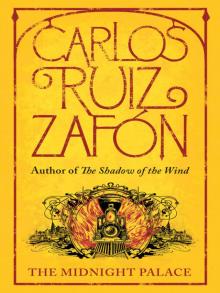 The Midnight Palace
The Midnight Palace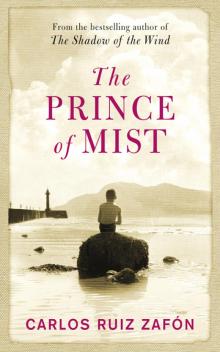 The Prince of Mist
The Prince of Mist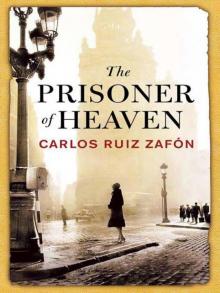 The Prisoner of Heaven: A Novel
The Prisoner of Heaven: A Novel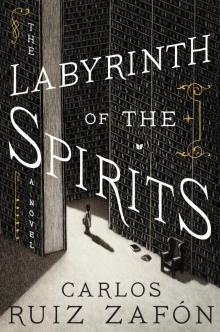 The Labyrinth of the Spirits
The Labyrinth of the Spirits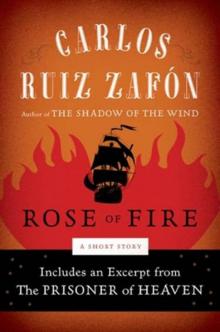 Rose of Fire
Rose of Fire